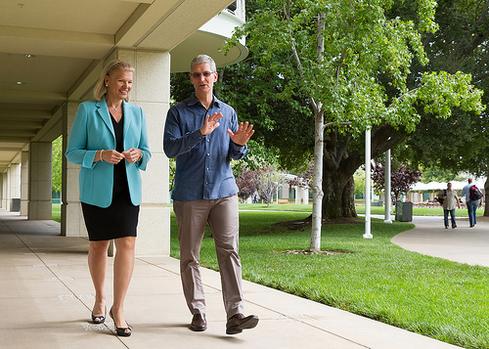Apple's Dominance Of Enterprise Mobility SlipsApple's Dominance Of Enterprise Mobility Slips
Android is gaining acceptance in business at the cost of Apple's iOS popularity while Microsoft languishes at the bottom.


Apple-IBM Deal: 9 Moves Rivals Should Make
Apple-IBM Deal: 9 Moves Rivals Should Make (Click image for larger view and slideshow.)
To hear Apple CEO Tim Cook tell it, the company's iPhone and iPad dominate mobile hardware for enterprises.
"...[O]ver 98% of the Fortune 500 and over 92% of the Global 500 [are] using iOS devices in their business today," Cook said in a statement introducing his company's enterprise mobility partnership with IBM last month.
But businesses also are using competing mobile devices, running Android, Windows Phone, or BlackBerry -- or all three -- often alongside iOS devices. Just because 98% of Fortune 500 companies use iOS doesn't mean that Apple's iOS accounts for 98% of the mobile enterprise market.
It appears that Apple's hold on the enterprise mobile market is slipping, although the company remains far ahead of the competition and its deal with IBM looks likely to fortify, if not improve, its position.
[Is West Coast phone theft about to plummet? Read California Nears Smartphone Kill Switch.]
According to Good Technology, Android device activations among its 5,000 worldwide enterprise clients during the second quarter of 2014 reached 32% of total activations, an increase of five percentage points. Activations during this period for iOS devices, meanwhile, declined five percentage points to 67% of total activations. That leaves 1% for Windows Phone, which has remained flat for the past five quarters. BlackBerry activations are not tracked by Good Technology.
Android also is advancing in number of app activations, though it clearly has far to go. Android apps accounted for 12% of total app activations, a gain of four percentage points that comes from iOS app activations, which dropped from 92% in the first quarter of 2014 to 88% in the second quarter.
Assuming there's some lag between activating a device and actually using it for corporate work, app activations appear to reflect current device usage while device activations appear to indicate potential future device usage.
The good news for Apple is that its iPad remains the enterprise favorite, accounting for 90% of tablet activations. Android tablets represented 10% of activations, consistent with the third quarter of 2013 but down from 16% in the second quarter of 2013.
But Android phones are finding more fans among enterprise customers. They represented 30% of enterprise device activations, an increase of four percentage points. Apple's iPhone remained flat at 51% of all enterprise device activations.
Apple's leadership in the enterprise mobility market looks like it will continue for years, but Android is making slow, steady progress. It's Microsoft that should be most concerned about Good Technology's findings. To survive in the mobile enterprise market, Microsoft has to start winning more than 1% of enterprise mobile device activations.
Consumerization means CIOs must grant personal devices access to corporate data and networks. Here's how to avoid loss and corruption. Get the new Mobile Security Action Plan issue of information Tech Digest today (free registration required).
About the Author
You May Also Like






